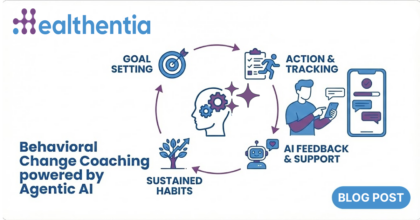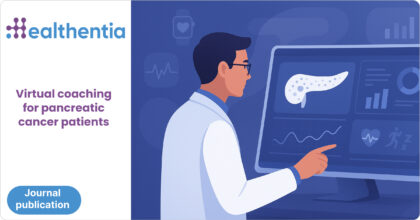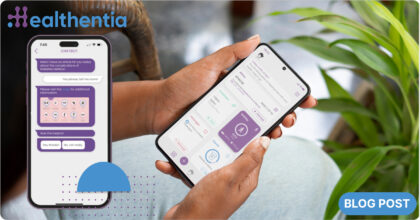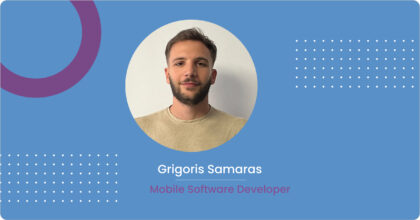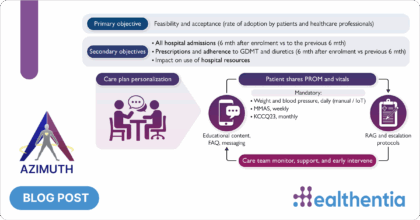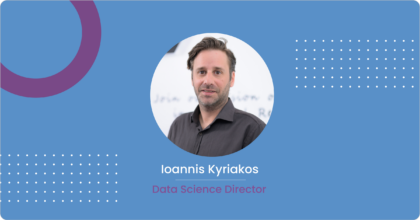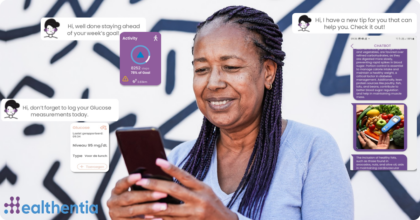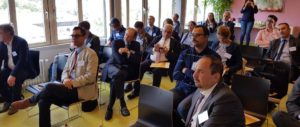
- R&D – market
- regulation – innovation
- technology – need
- academia – industry
Welcoming audience
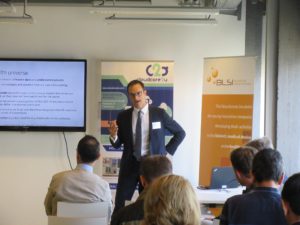
The workshop took place in the Brussels Life Science Incubator, where Innovation Sprint is located.
Dr. Sofoklis Kyriazakos, CEO of Innovation Sprint, welcomed the audience that included people from Belgium, several European countries and the US. He briefly presented the start of the journey of the company into the eHealth “universe”, the main products of the company, namely CloudCare2U and Actionable Health 360 and invited the keynote speakers to address the workshop attendees.
First keynote
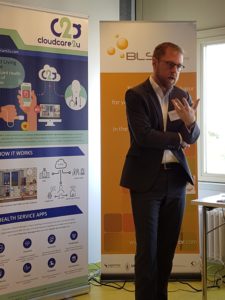
First keynote speaker was Horst Kraemmer from DG CONNECT. Horst presented aspects of the Health and Care in the Digital Single Market. He also emphasized the priority for Prevention and presented the status and the things to do.
According to OECD/EU) and the “Health at a Glance: Europe 2016”, the deaths from major non-communicable diseases count 3.4 million potentially productive life years lost and 115bn € in potential economic loss.
Reports
Based on a report from the Special Eurobarometer 460 on “Attitudes towards the impact of digitisation and automation on daily life” (2017), a majority (52%) of citizens would like to have online access to their medical or health records. On the same time only 9% of hospitals in Europe allow citizens some access online to their own patient records. Most of those only give partial access, according to the European Hospital Survey – Benchmarking Deployment of eHealth Services (PwC).
A study from the Special Eurobarometer 460 on “Attitudes towards the impact of digitisation and automation on daily life” (2017) shows that overall, seven in ten respondents (70%) would be willing to share their health and personal wellbeing data.
Furthermore, according to the Special Eurobarometer 460 on “Attitudes towards the impact of digitisation and automation on daily life” (2017), only 18% of citizens have used health and care services provided online in the last 12 months.
Horst presented his considerations about the Valley of Death, where on the one hand side there are plenty of solutions and SMEs that develop products for the Health market with positive results.
At the concluding part of the presentation, the barriers and success factors that are observed in the European Union were presented and the EC policy approach to making this a success, which includes the public consultation on Health and Care for the Digital Single Market.
Second keynote
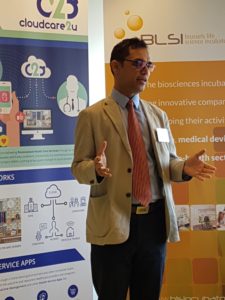
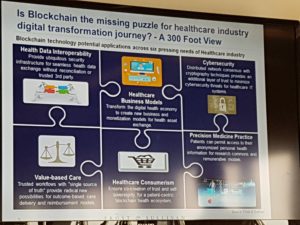
The second keynote speaker was Ntin Naik, Global Vice President from Frost & Sullivan (US). Ntin presented the Convergence of Blockchain with AI and IoMT set to re-architect the Healthcare sector.
Ntin presented the Frost & Sullivan’s 2017 Healthcare CEO Survey addressing the growth objective, the customer orientation, the competition, the innovation and the business model for the healthcare sector.
He emphasized that Leading healthcare companies are investing in tech-enabled solutions with the end goal of “Digital Transformation”. A focal point in this keynote presentation was the Blockchain technology and the possibility to be the missing puzzle for digital transformation journey in the healthcare industry. In this direction, the convergence potential of emerging technologies, e.g.
AI and IoMT, were presented, as well as the ways that precision medicine can be implemented.
Further considerations about the application of Blockchain in Precision Medicine and the Differentiation of the Hype from Reality were discussed.
Ntin closed his presentation with a reference to all the healthcare challenges of the Blockchain implementation.
First Session
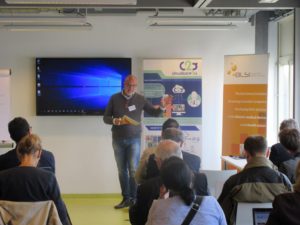
Following the keynote speeches, Alfredo Cesario, CSO-BIO of Innovation Sprint, introduced the first session of the day “Digital transformation in the Healthcare industry”.
Alfredo talked about P4 digital medicine and the enabling technological tools.
He presented the novel phenotypes in individual patients with severe co-morbidities of chronic diseases. He compared them with traditional phenotypes. Alfredo also presented how «integrative» approaches on precise phenotypes can support health promotion and P4 personalized medicine.
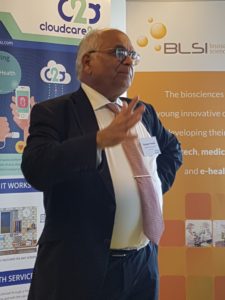
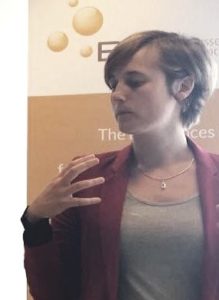 .
. 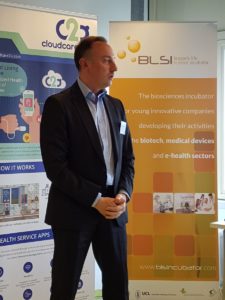
The first presentation of Session 1, was from Prof. Ramjee Prasad from Aarhus University.
Prof. talked about the new digital era and the impact in the global economy.
Ramjee briefly mentioned the recent technological advancements and introduced novel concept, like the Human Bond Communication and Knowledge Home and 7 Senses that take the technology to a new dimension.
Camille Mommer was the next speaker and she pointed out the activities of lifetech.brussels, the single point of entry to support health innovation in Brussels
Among the objectives of lifetech.brussels is to speed up the accessibility to innovative solutions, to set up a local governance on eHealth, to engage and bring the commitment of public authorities, to make industry (supply) and care institutions (demand) talk together and to align public funding with real needs.
Lifetech.brussels is running business-coaching services for individuals and startups. It has 2 acceleration programs, namely MedTech and eHealth Accelerator. Lifetech.brussels, it is managing the Health 2.0 Brussels chapter, the Enterprise Europe Network and ECHAlliance in Belgium and coordinates the Connect2 project that aims to foster interoperability across the healthcare sector in Brussels Capital Region.
Gianluca Arialdi, CEO of the Brussels Life Science Incubator (BLSI), was the next speaker.
He presented how BLSI supports young entrepreneurs in creating innovative businesses in the life sciences and health sector.
BLSI is supported by Université Catholique de Louvain and Brussels Capital Region and has its focus on e-Health, Medical devices and Biotechnologies. BLSI is co-located with Cliniques Saint-Luc. This creates an environment for additional synergies for clinical tests, R&D projects and industrial PhDs.
Final presentation
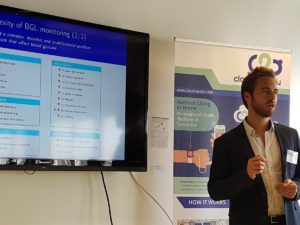
The last presentation of Session 1, gave Guillaume Gustin, Université Catholique de Louvain. His topic was on Empowerment of diabetic patients through mHealth technologies and education.
Guillaume presented the challenges of diabetes disease, as well as the importance and complexity of BGL monitoring.
He then introduced Eglé app that can support patient empowerment through the development of a scalable platform of self-management tools. These tools aim to improve medical care and foster communication between the patient, the family and HCPs.
The app performs an HbA1c estimation and provides numerous self-monitoring widgets, e.g. glycaemia, physical activity, etc. Eglé app provides an insulin bolus assistant that have informally validated experts.
Session 2
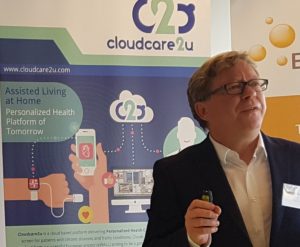
Session 2 of the program, was about Coaching systems and applications. The session chaired Hermie Hermens, CSO-eHealth of Innovation Sprint.
Hermie started the session with a presentation on Next generation monitoring and coaching systems . He highlighted the strong relationship between behavior and Health and the need for artificial personal coaching systems.
The presentation included 3 generations of coaching systems and gave emphasis on next generation systems that will be smarter, enabled by rapid changes in technology, based on data driven modeling and mining and towards more persuasive user interactions.
First presentation
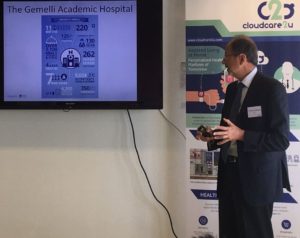
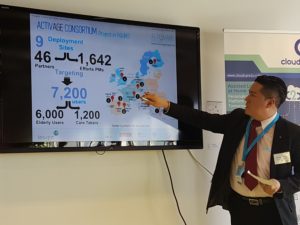 .
. 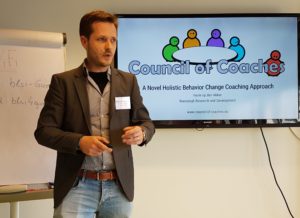
Vincenzo Valentini, from Fondazione Policlinico Gemelli, has continued with a presentation about an innovative e-coaching solutions in cancer. Vincenzo introduced his presentation with statistics from Gemelli Hospital. He highlighted the number of total patients treatments, i.e. 42,814 per year. Further to that he explained how the evidence, the physician factors and the constraints influence a clinical decision.
He presented also, the Edmonton Symptom Assessment Scale and the Valeo+ app, Valuation Endorsed by Oncology Patinet and concluded with the FORECAST cloud platform concept. FOREACST is a coaching system for stress management of cancer patients aiming to increase their wellbeing at home.
Martin Serrano, from the Insight Centre for Data Analytics, presented the smart technologies for better, independent, assisted health services ecosystem. Martin started with facts around ageing in Europe and he highlighted the challenges ahead. According to the European Commission study, “Population Aging in Europe: Facts, Implications, and Policies” (2014), “The ageing of Europe, also known as the greying of Europe, is a demographic phenomenon in Europe characterized by a decrease in fertility, a decrease in mortality rate, and a higher life expectancy among European populations. Europe is ageing and by 2060 one in three Europeans will be over 65. The ratio of Working people to the “inactive” (retired) is Shifting from 4 to 1 today to 2 to 1 by 2060. Predictions according to the Innovation for Active and Healthy Ageing (2015).
He then presented an Internet of “Healthcare” Things vision from eHealth to cHealth and beyond and the ACTIVAGE digital health landscape.
Third presentation
Harm op den Akker from RRD presented the Council of Coaches project .This Project has recently started and aims to design, develop and evaluate a Virtual Coaching System. Project targets at older adults that are undergoing life changing events that have a potential negative impact on physical, cognitive, mental, and/or social well-being. Council of Coaches introduces a new coaching paradigm where the virtual coach is manifested in a group of virtual characters. Each one, represents a different knowledge domain of the coach.
Fourth presentation
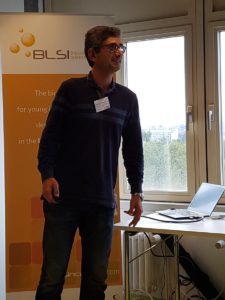
The concluding presentation of Session 2 was on “GOAL: Gamification for a healthy life”. This presentation gave Aristodemos Pnevmatikakis from Athens Information Technology. GOAL is a H2020 funded project that aims to help people, especially the elderly, to stay motivated into leading socially engaged, physically and cognitively active lifestyles. GOAL provides games and apps that gamify aspects of life. That happens by involving peers and families organized in circles, by quantifying achievements by a virtual currency, exchangeable for benefits in apps, and favors from circles.
Session 3
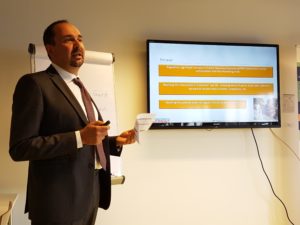
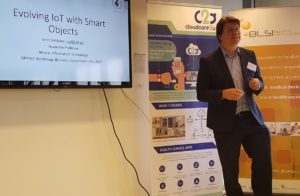
Session 3 of the workshop was on IoT and Big Data. In this session chaired Paolo Morelli, CSO- Head of Clinical Research in Innovation Sprint. Paolo presented the role of IoT in Clinical Trials and started with the need from regulatory perspective, the reaching of measurements of patients’ life and the easier reaching of patients to support clinical study recruitment. He then presented the challenges and the approach of applying IoT in clinical trials; an approach supported by CloudCare2U and Symphony EDC systems.
Presentations
Subsequently, John Soldatos from Athens Information Technology gave a presentation on Evolving IoT with Smart Objects.
John started with presentation of the IoT development phases highlighting the current one, which is based on smart objects.
The IoT Cloud Convergence was then discussed as well as solutions in the forms of IaaS, PaaS and SaaS. IoT platform interoperability was presented, as well as flagship projects, like OpenIoT and FIESTA. The presentation continued with the IoT reference architectures and the rise of smart objects.
The topic of Blockchain was also addressed and the example of a factory automation based on edge-computing and ledger services of the FAR-EDGE project. The presentation concluded with the emphasis on security and the new initiative of the H2020 SecureIoT project.
The final presentation of the workshop was by Christina Kyriakopoulou, European Commission DG RTD, on “Big Data perspectives in EU Health collaborative research”. Christina presented Big Data perspectives in various Programs of the EC with emphasis on collaborative research around health topics.
Major Outcomes
The major outcomes of the workshop can be summarized as follows:
- There is clearly a need for a Digital Transformation in the Healthcare sector
- Emerging technologies and infrastructures can contribute to the Digital Transformation
- Healthcare is open for disruptive technologies and business models, including Blockchain
- the European Commission facilitates Health and Care in the Digital Single Market with various tools
- Mobile apps and cloud platforms should focus more on the patient and address the technology acceptance aspects
- there are many ongoing project initiatives that generate value and can achieve a high impact in Europe and the world.
Innovation Sprint will host Sprint #2 workshop in 2018 with updates on Digital Transformation for the Healthcare sector.
For more information, please contact us here.
